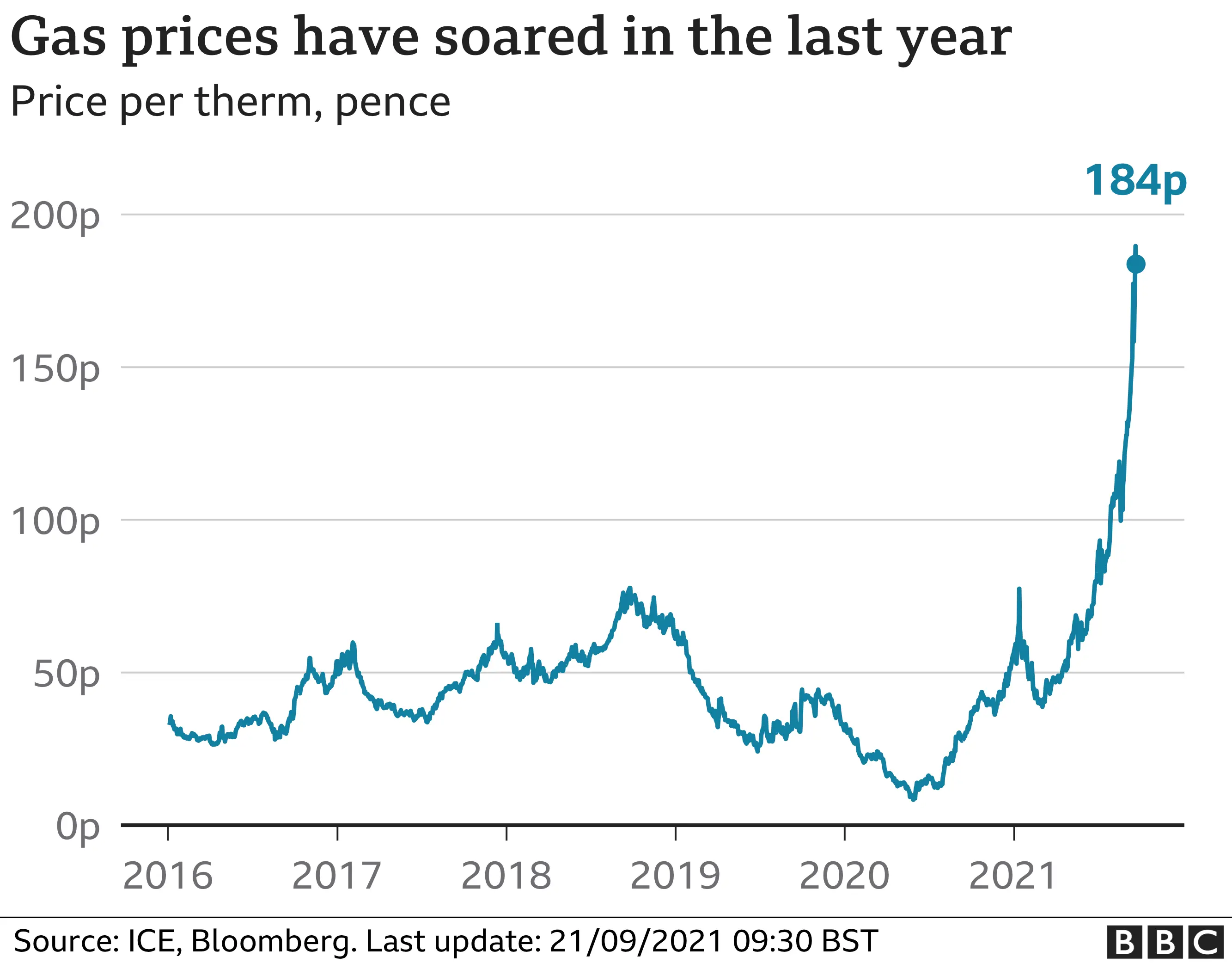Failing energy firms may mean higher bills, warns regulator
 Getty Images
Getty ImagesThe cost of protecting customers from failing energy providers could lead to higher bills, the boss of the energy regulator Ofgem has told the BBC.
It comes as energy firm Green said it was on the brink of collapse due to soaring wholesale gas prices.
"As underlying costs rise, pressure on bills does go up", Jonathan Brearley, Ofgem chief executive said.
The government has said it is looking at lending money to bigger firms to help them take on stranded customers.
If an energy firm collapses, customers are automatically switched to a tariff provided by the new supplier. This is a tariff agreed with the regulator Ofgem, but it may well be more expensive than the deal they had with the former company which went bust.
Mr Brearley said protecting customers of failed energy firms was the regulator's "number one priority".
However, he said it was too early to predict how expensive it would be to ensure that they were transferred to other suppliers in an orderly way.
Peter McGirr, founder and chief executive of Green, told the BBC it had appointed a restructuring firm in an attempt to survive the current crisis.
Mr McGirr said the firm was in "deep, deep trouble and our heads are unlikely to bob back to the surface".
Green has 180 staff based in Newcastle upon Tyne and has 250,000 UK customers.
Mr McGirr said the appointment of Alvarez and Marsal was currently on an "advisory and restructuring" basis, but admitted Green could fall into administration within weeks.
"We need to try to hold on long enough to get some support", he added.
The company has been in discussions with the government and energy regulator Ofgem, but has not been offered any support.
Mr McGirr said he believed the larger energy suppliers had too much influence in the crisis talks being held with government and said the big companies had an interest in more of the smaller suppliers going to the wall.
Cost implications
Asked whether these costs would be met by the taxpayer, or spread across all energy customers' bills, he said: "We have to first of all make sure that customers are transferred and looked after and then as we see the market evolve we will understand better the cost implications."
Customers on some tariffs are protected from sudden hikes in wholesale gas prices through the energy price cap, which limits how much firms can charge per unit of gas.
The price cap covers 15 million households across England, Wales and Scotland.
Mr Brearley said it was too early to predict how much the energy price cap would rise next year.

So far, four energy firms have gone to the wall, including People's Energy and Utility Point, and four more are expected to follow in the coming days.
Industry sources fear there may be as few as 10 energy suppliers left by the end of the year, down from 70 in January.
But Mr Brearley predicted that a number of small suppliers would survive the current crisis, as well as larger ones, maintaining a diverse market with plenty of choice for consumers.
When asked if Ofgem was "asleep at the wheel" and should have prevented suppliers from making promises to customers which they wouldn't be able to keep if prices rose, Mr Brearley replied: "No - we have always protected customers interests and we work very closely with the companies.
"We work closely with all companies to assess their financial position. And if they need to exit the market we have well-rehearsed systems and processes to manage that."
Loans 'must be paid back'
Business Secretary Kwasi Kwarteng earlier denied that failed energy companies would get government bailouts, saying: "I do not think it's the right thing for taxpayers' money to be injected into companies that have been badly run."
However, he said the government was exploring the possibility of lending money to bigger energy firms to help them absorb the cost of taking on new customers from companies that had gone bust.
"If we do have this policy, they will be expected to pay back the loans," he added.
Mr Kwarteng also warned many UK households could face a "very difficult winter", with fuel prices surging and the £20-a-week temporary uplift in universal credit due to end in October.
The government and Ofgem have both dismissed suggestions that the cap on energy prices would be lifted ahead of an agreed 12% rise in October, saying that keeping it was the "clear and agreed position".
The price cap is reviewed twice a year. It applies only to standard variable or default tariffs. These types of tariff are typically the most expensive plan that a supplier offers.
When fixed energy deals expire, as they generally do after one or two years, customers are likely to be put on these tariffs.

What happens if your energy supplier goes bust?
 Getty Images
Getty Images- Customers will still continue to receive gas or electricity even if the energy supplier goes bust. Ofgem will move your account to a new supplier, but it may take a few weeks. Your new supplier should then contact you to explain what is happening with your account
- While you wait to hear from your new supplier: check your current balance and - if possible - download any bills; take a photo of your meter reading
- If you pay by direct debit, there is no need to cancel it straight away, Citizens Advice says. Wait until your new account is set up before you cancel it
- If you are in credit, your money is protected and you'll be paid back. If you were in debt to the old supplier, you'll still have to pay the money back to your new supplier instead

Mr Brearley said the industry had seen "an unprecedented rise in gas prices".
"They are almost four times what they normally are and that would put any industry under strain," he added.
The government and Ofgem say the UK does not have gas supply problems because of a diverse range of sources "that can more than meet demand".
However, energy bills are facing particular pressures in Great Britain because of a dip in renewable energy supplies due to low wind, as well as the outage of a power cable supplying electricity from France.
The International Energy Agency has called on Russia to supply more gas to Europe, saying "it could do more to increase gas availability to Europe and ensure storage is filled to adequate levels", in preparation for the winter.
It added: "Based on the available information, Russia is fulfilling its long-term contracts with European counterparts - but its exports to Europe are down from their 2019 level.
"This is also an opportunity for Russia to underscore its credentials as a reliable supplier to the European market."

'I'm just watching the meter go up'
 Stacey Stothard
Stacey StothardStacey Stothard followed all the advice. Aware that energy prices were rising, she shopped around to find a decent fixed deal for her gas and electricity.
She saved £300 - or so she thought.
Her new energy supplier went bust and now she will be switched automatically to another one, and she is facing much higher bills, potentially amounting to hundreds of pounds more a year.
"It is just like watching the meter go up and up," she says. "I did the right thing - not going for the cheapest deal, but choosing a company with a decent customer service record."


- BEAUTIFUL WORLD, WHERE ARE YOU?: Listen to Sally Rooney's highly anticipated new novel
- WERE HIGH HEELS ORIGINALLY INVENTED FOR MEN?: How they became a fashion staple

